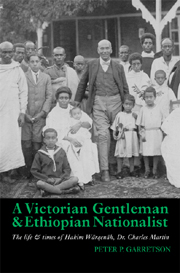 A Victorian Gentleman and Ethiopian Nationalist
A Victorian Gentleman and Ethiopian Nationalist Book contents
- Frontmatter
- Contents
- List of Illustrations
- Transliteration
- Note on the Ethiopian Calendar
- Glossary
- Acknowledgements
- Map 1 Ethiopia 1900–1950
- Map 2 Burma 1898–1919
- Introduction
- 1 Youth & education
- 2 Return to Ethiopia (1896–1901)
- 3 Campaigning in the Ogaden & return to Burma (1901–1907)
- 4 Transitions in life
- 5 A man of substance in Ethiopia & Burma
- 6 Return of a progressive to Addis Ababa (1919–1924)
- 7 An increased pace of modernization (1924–1930)
- 8 International diplomacy, education & recruitment
- 9 Governor of a model province, Chärchär (1930–1935)
- 10 Ethiopian ambassador to the Court of St. James (1935–1936)
- 11 London & India
- 12 Ethiopia
- Conclusion
- Bibliography
- Index
Introduction
Published online by Cambridge University Press: 05 April 2013
- Frontmatter
- Contents
- List of Illustrations
- Transliteration
- Note on the Ethiopian Calendar
- Glossary
- Acknowledgements
- Map 1 Ethiopia 1900–1950
- Map 2 Burma 1898–1919
- Introduction
- 1 Youth & education
- 2 Return to Ethiopia (1896–1901)
- 3 Campaigning in the Ogaden & return to Burma (1901–1907)
- 4 Transitions in life
- 5 A man of substance in Ethiopia & Burma
- 6 Return of a progressive to Addis Ababa (1919–1924)
- 7 An increased pace of modernization (1924–1930)
- 8 International diplomacy, education & recruitment
- 9 Governor of a model province, Chärchär (1930–1935)
- 10 Ethiopian ambassador to the Court of St. James (1935–1936)
- 11 London & India
- 12 Ethiopia
- Conclusion
- Bibliography
- Index
Summary
Hakim Wärqenäh Eshäté's life was one full of change, often dramatic change. A statesman, administrator, author and Ethiopia's first western trained physician, he was a major progressive influence on modern Ethiopian history. He played a significant role in influencing twentieth century medicine, education, diplomacy and economic development in Ethiopia. His appointment in 1935 as Ethiopian ambassador to London marked the climax of his career. Although born an Ethiopian, he spent most of his life outside his home country. He was a product of his Victorian upbringing and the British educational system - more international than national, living in many different countries but never wholly belonging in any of them. His search for his identity, and how he and others defined it, played a significant part in his life.
Wärqenäh was born in Gondar, Ethiopia on October 22nd, 1865, a member of the northern Ethiopian elite who were in the process of being overthrown. As an infant he and his parents were imprisoned by Emperor Téwodros on an isolated plateau, Mäqdäla, in central Ethiopia. In 1868 when Britain invaded Ethiopia to free western hostages taken by Téwodros, the three-year-old Wärqenäh was abandoned on the field of battle. Colonel Charles Chamberlain of the 23rd Indian Pioneer Regiment of Rawalpindi, India picked him up and took him to India where he was brought up and educated. Colonel Chamberlain died three years later leaving the young boy in the care of another military figure, Colonel Charles Martin, who paid for his education at various missionary schools in India.
- Type
- Chapter
- Information
- A Victorian Gentleman and Ethiopian NationalistThe Life and Times of Hakim Wärqenäh, Dr. Charles Martin, pp. 1 - 6Publisher: Boydell & BrewerPrint publication year: 2012


